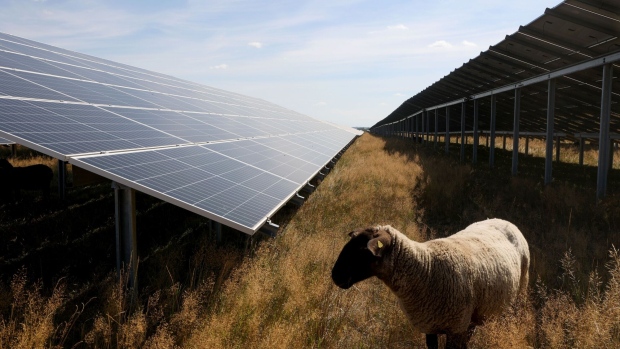May 29, 2024
Germany’s Climate Transition Costs to Spiral as Subsidies Double
, Bloomberg News

(Bloomberg) -- Germany will need to find more cash to fund its energy transition ambitions this year after the subsidies it must pay renewables producers doubled on the back of tumbling wholesale power prices.
The state will pay as much as €20 billion ($21.7 billion) to wind and solar operators through the end of 2024, twice what grid operators had forecast in October, Economy Minister Robert Habeck told reporters in Berlin on Wednesday.
European wholesale power prices have fallen sharply over the last year and are hovering at levels seen before the energy crisis set in motion by Russia’s invasion of Ukraine. That means the government must shell out the difference to ensure renewables producers get paid their guaranteed minimum strike price.
Read more: German Solar Generation Hits Record, Prices Dip Across Europe
The nation’s renewable fund has already been hit by losses of over €130 million in February, according to data from energy think tank Fraunhofer ISE. The cash crunch will complicate the country’s often-heated budget discussions this year with Finance Minister Christian Lindner having ruled out additional allocations in next year’s budget and vowing to enforce strict borrowing rules.
While lower power prices are generally good news for consumers and businesses, “it has the consequence that this difference has to be paid now,” Habeck said, especially since the old contracts are “expensive.”
Complicating Germany’s fiscal challenge is the fact that Europe’s top economy has no upper cap for its renewable subsidies, which allows operators to rake in excess profits while the government covers any losses.
Read more: Solar Panel Saturation in Germany Sends Revenues Tumbling
Germany’s power subsidy plan — first introduced in 2000 — initially covered all green sources, but no longer includes offshore wind since that sector has become profitable. For other green energy producers — especially solar — subsidies continue.
The nation added about 14 gigawatts of solar capacity last year — more than anywhere else in Europe — adding to the costs for the government. Since 2023, the subsidy bill is no longer paid by the customers but by the nation’s climate and transformation fund.
--With assistance from William Mathis and Kamil Kowalcze.
©2024 Bloomberg L.P.





